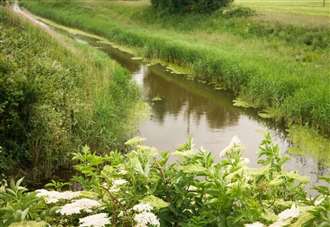-
 play_arrow
play_arrow
Kl 1 Radio Local radio for west Norfolk
-
 play_arrow
play_arrow
KL DISCO KL Disco Playing Disco Music from the 70's onwards.24/7
-
 play_arrow
play_arrow
KL COUNTRY KL COUNTRY Playing New and Classic Country Music 24/7
-
 play_arrow
play_arrow
KL ROX KL ROX The best of New and Classic Rock.24/7
-
 play_arrow
play_arrow
KL SUMMER Summer Vibes 24/7 from KL1 Radio across West Norfolk
-
 play_arrow
play_arrow
KL CLASSICAL Your Symphony Starts Here
-
 play_arrow
play_arrow
KL CHILL Just Chill!
-
 play_arrow
play_arrow
KL POP The Best POP Hits all day Long!
-
 play_arrow
play_arrow
KL XTRA KL XTRA
music_note

Campaigners hope a new study investigating a ‘forgotten chalk stream’ in West Norfolk will help conserve it for future generations.Funding has been secured for a major study into the Gaywood River, which will probe how it could be better managed to help restore it to former glory.It follows concerns that current methods of flood prevention are damaging its sensitive ecology, with critics calling the approach “outdated”.
The multi-agency project is backed by West Norfolk Council, King’s Lynn Internal Drainage Board (KLIDB), Anglian Water and Norfolk Rivers Trust and it can now go ahead after securing funding.
NORFOLK’S FORGOTTEN CHALK STREAMThe waterway, which rises from springs to the east of Derby Fen before running out towards The Wash and flowing into the River Great Ouse, has become the focus of concern among environmental groups.It is one of only 210 rare chalk streams in the world, which are often described as ‘England’s rainforests’ due to their importance to wildlife. However, pollution, over-abstraction and intensive management have seriously harmed these precious habitats.Since the 15th century the lower reaches of the Gaywood have been diverted, re-routed, straightened and narrowed due to drainage measures. Upstream, it still contains many natural features and it is home to various species of fish, aquatic plants and insects.Critics argue that it has been over maintained by the KLIDB for years and that the organisation “previously treated the Gaywood akin to a man-made Fenland drain”.PROBE TO BEGIN The study will explore the options for flood risk management while enhancing and restoring the river and its catchment. Information on the project comes from the Water Management Alliance (WMA), a consortium of Internal Drainage Boards (IDBs).Engineering experts Atkins Réalis will be carrying out the study, using hydraulic modelling and local data.The WMA added: “Their experience with Fenland and chalk river systems ensures a strong foundation for informed and sustainable approaches. Together, we’re working toward a healthier, more resilient Gaywood River.”STUDY WELCOMED The waterway has become a focus of serious concern among environmental groups.Gaywood River Revival, a local campaign group, has been calling for a different approach to flood risk management for several years.Spokesman Peter Clitheroe said: “This study is long overdue.“Alongside careful consultation with those who know the river and its chalk stream ecology, it should go some way towards helping address key issues concerning the historical and outdated management of the Gaywood.” The River Gaywood flows into the River Great Ouse at King’s Lynn, before it drains into the Wash estuary (Image: Newsquest)Rob Colwell, county councillor for Gaywood South, added: “The local community has a huge desire for the Gaywood River, a rare chalk stream, to be restored.“This is a first step to reassure all agencies that any restoration work that might follow will be safe for the residents of Gaywood and King’s Lynn.”CHALK STREAMS UNDER THREAT About 85 per cent of the world’s chalk streams are found in England, with 29 per cent of them in East Anglia.Other chalk streams in Norfolk include the Wensum, Babingley and Glaven rivers.Most water we drink in the East comes from rainwater stored deep beneath our feet in natural chalk ‘aquifers’, which also feed our chalk streams.A recent report by the Worldwide Fund For Nature (WWF) found that more than three-quarters of England’s chalk streams are not in good health. Studies have found the poor condition of these rare waterways is affecting the biodiversity of the habitats.Brown trout, a once common species in these rivers, have disappeared from two-thirds of chalk streams in the country.But work has been under way to restore these habitats in recent years, with projects proving successful.
Similar posts
Upcoming shows

Chris Fisher – KL1 Mornings
10:00 am - 1:00 pm

Tim Lee – KL1 Afternoons
1:00 pm - 4:00 pm

Richard Dix – KL1 Drive
4:00 pm - 7:00 pm

80’s ’til 8
7:00 pm - 8:00 pm

Nathan Barton – The Cut
8:00 pm - 11:00 pm
Message Us
Copyright The Mediasite UK - 2025








